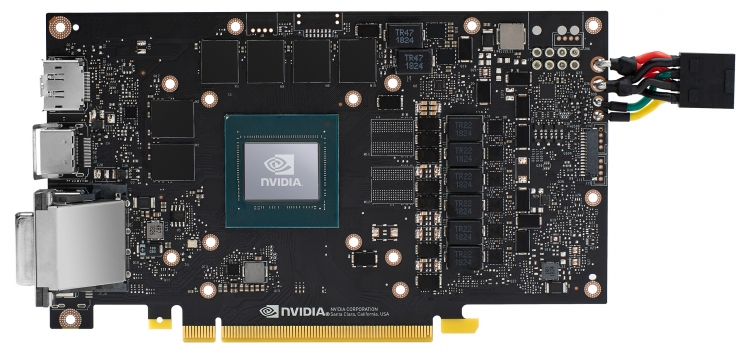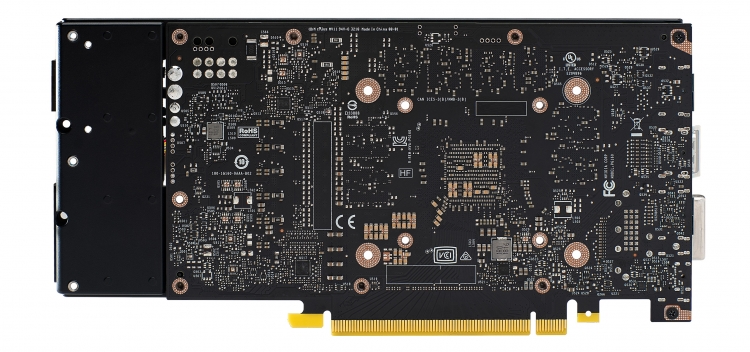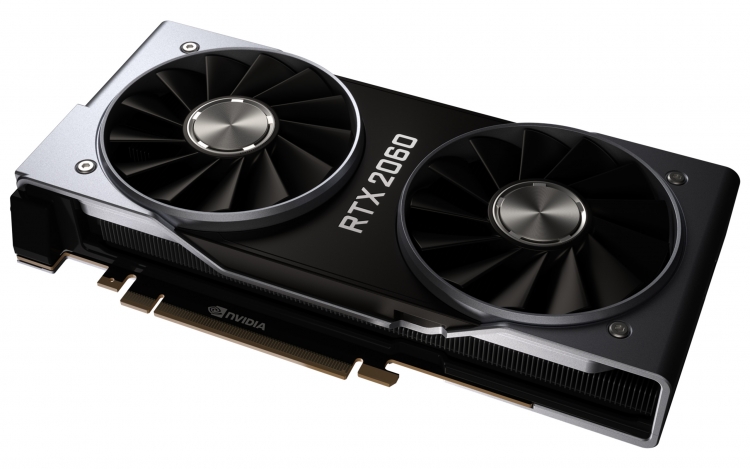Gossip, surrounding the 60th model GeForce series 20, finally dispelled. It really RTX, and therefore, RT- and tensor kernel from it have not gone away. We'll see, We are new rendering technology for use in the mid-market accelerators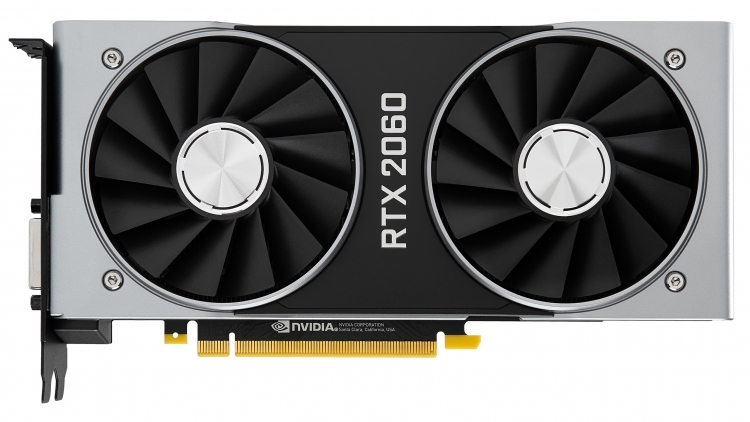
Specifications. Design. Printed circuit board
GPUs Turing family, that NVIDIA has released four months ago, It became one of the biggest events in the history of 3D-graphics. Graphics card for home PCs and workstations first purchased ray-tracing functions in real-time. Albeit that only Battlefield V so fresh 3DMark tests provide an opportunity to see Ray Tracing in, the introduction of this technology in other projects, too, is not far off, and in the future it is ray tracing will support the development of computer games. After all, it not only provides a fundamentally different quality of light, but also facilitates the task of developers at the expense of, that those effects, that in the context of rasterization requires laborious manual tuning, Now elegantly automated.
However, the first NVIDIA's expertise in this area has made it clear, that the transition to a hybrid model of rendering (so the company calls a combination of dithering with ray tracing) It comes for free. Series video card GeForce RTX 20 not so different from the previous generation of performance in games without raytracing, how they, in turn, their predecessors. In this case, three models, presented in August (GeForce RTX 2070, RTX 2080 и RTX 2080 Ti), It turned out to be so expensive, that the rule GPU upgrade, which previously worked flawlessly (More FPS for the same money), is no longer valid.
Finally, Battlefield V experience has shown, that Ray Tracing in real time while hardly given even less powerful hardware, as new accelerators chips Turing. Therefore, until the time, When NVIDIA introduced GeForce RTX 2060, it was unclear, whether the company plans to extend the Turing architecture unchanged at mid-priced video, or a hybrid rendering device yet remains a privilege for $500 and higher. But doubts remained in the past, Indeed, the name RTX 2060 says, that ray tracing in the pre-mass graphical maps the green light.
Specifications, price
In the first wave models 20-series GeForce RTX 2070 It was the only graphics card, which was fully functional GPU, while the GeForce RTX 2080 и RTX 2080 Ti built on GPU with partially blocked calculation units. chip TU106, which debuted in the GeForce RTX 2070, It refers to the third tier Turing family and is a formal successor GP106, but by the standards of previous NVIDIA architecture - Pascal - it's still an extremely large crystal: Transistor budget 10,8 billion, is second only to GP102 (12 billion transistors) and 50 % superior GP104. This means, Issue the following model series GeForce RTX 20 based on the "cut" chips TU106 was absolutely logical step from NVIDIA. The only intrigue in such situations - this is the scale of losses in a set of computational graphics processing units.
TU106 configuration GeForce RTX 2060 It has 1920 CUDA active nuclei (in this case, we consider only the core, operating operation FP32), distributed by 30 streaming multiprocessors (Streaming Multiprocessor, SM), while "physically" crystal consists of 36 SM and comprises 2304 CUDA-core. NVIDIA chips, issued since the Fermi architecture, allow you to scale all the major hardware components of the conveyor by turning off defective or simply "unnecessary" for a specific model SM. Consequently, GeForce RTX 2060 both lost 17% computing power in the performance of 32-bit floating-point operations (CUDA-Yar FP32), integer operations (CUDA-core INT32) and texturing speed. And yet GeForce RTX 2060 there are still many of the original power of GeForce RTX 2070. for comparison: GeForce GTX 1060 It contains 1,5 CUDA-half nuclei, than the next-oldest model - GTX 1070. But the main, GP106 processor even in the "truncated" form of preserved part of the logic, Turing architecture distinguishes from its predecessors, - tensor kernel and kernel ray tracing.
| Manufacturer | NVIDIA | ||||||
|---|---|---|---|---|---|---|---|
| Title | GP104 | GP102 | GP100 | GV100 | TU106 | TU104 | TU102 |
| microarchitecture | Pascal | Pascal | Pascal | Time | Turing | Turing | Turing |
| Tehprocess, nm | 16 nm FinFET | 16 nm FinFET | 16 nm FinFET | 12 nm FFN | 12 nm FFN | 12 nm FFN | 12 nm FFN |
| the number of transistors, million | 7 200 | 12 000 | 15 300 | 21 100 | 10 800 | 13 600 | 18 600 |
| chip area, mm2 | 314 | 471 | 610 | 815 | 445 | 545 | 754 |
| Configuration SM / TPC / GPC | |||||||
| Number SM | 20 | 30 | 60 | 84 | 36 | 48 | 72 |
| Cislo TPC | 20 | 30 | 30 | 42 | 18 | 24 | 36 |
| Cislo GPC | 4 | 6 | 6 | 6 | 3 | 6 | 6 |
| The configuration of the streaming multiprocessor (SM) | |||||||
| FP32-core | 128 | 128 | 64 | 64 | 64 | 64 | 64 |
| FP64-core | 4 | 4 | 32 | 32 | 2 | 2 | 2 |
| INT32-core | N / A | N / A | N / A | 64 | 64 | 64 | 64 |
| tensor core | N / A | N / A | N / A | 8 | 8 | 8 | 8 |
| RT-core | N / A | N / A | N / A | N / A | 1 | 1 | 1 |
| Programmable GPU computing units | |||||||
| FP32-core | 2 560 | 3 840 | 3 840 | 5 376 | 2 304 | 3 072 | 4 608 |
| FP64-core | 80 | 120 | 1 920 | 2 688 | 72 | 96 | 144 |
| INT32-core | N / A | N / A | N / A | 5 376 | 2 304 | 3 072 | 4 608 |
| tensor core | N / A | N / A | N / A | 672 | 288 | 384 | 576 |
| RT-core | N / A | N / A | N / A | N / A | 36 | 48 | 72 |
| Blocks fixed functionality | |||||||
| TMU (texturing units) | 160 | 240 | 240 | 336 | 144 | 192 | 288 |
| ROP | 64 | 96 | 128 | 128 | 64 | 64 | 96 |
| memory configuration | |||||||
| L1 cache size / the texture cache, KB | 48 | 48 | 24 | ≤ 128 of 128, the total shared memory | 32/64 of 96 (the total shared memory) | 32/64 of 96 (the total shared memory) | 32/64 of 96 (the total shared memory) |
| Shared memory / SM, KB | 96 | 96 | 64 | ≤ 96 of 128 (shared with the L1 cache) | 32/64 of 96 (shared with the L1 cache) | 32/64 of 96 (shared with the L1 cache) | 32/64 of 96 (shared with the L1 cache) |
| The volume of the register file / SM, KB | 256 | 256 | 256 | 256 | 256 | 256 | 256 |
| The volume of the register file / GPU, KB | 5 120 | 7 680 | 15 360 | 21 504 | 9 216 | 12 288 | 18 432 |
| L2 cache size, KB | 2 048 | 3 072 | 4 096 | 6 144 | 4 096 | 4 096 | 6 144 |
| Bit RAM bus, bit | 256 | 384 | 4 096 | 4 096 | 256 | 256 | 384 |
| Type of RAM chips | GDDR5/GDDR5X | GDDR5X | HBM2 | HBM2 | GDDR6 | GDDR6 | GDDR6 |
| bus NVLINK | N / A | N / A | 4 × NVLink 1.0 x8 | 6 × NVLink 2.0 x8 | N / A | 1 × NVLink 2.0 x8 | 2 × NVLink 2.0 x8 |
Transformation GeForce RTX 2070 в RTX 2060 much more struck by the part of the GPU, which is called the back-end: The memory controller, ROP units and the second level cache volume. NVIDIA TU106 disconnected in two of the eight 32-bit RAM controllers, and therefore, GPU now has a 192-bit memory bus, and GeForce RTX specifications 2060 provide 6 GB GDDR6 type with a capacity of 14 Gbit / s on bit bus. However, there are hints, that NVIDIA will not be limited only option GeForce RTX 2060 and will appear with a different volume configuration in the future (3 or 4 GB) and the type of chips (GDDR5). And if you look at the diversity of the GeForce GTX 1060, and the set of active computing units in the six potential (!) releases GeForce RTX 2060 can also vary.
The frequency range GPU novelty is not too different from the GeForce RTX 2070. NVIDIA lowered base frequency with nucleus 1410 to 1365 MHz, and at the same time Boost Clock was higher compared with the reference parameters RTX 2070: 1680 vs 1620 MHz. The reduced set of computational units affected the video TDP: power limit RTX 2060 и RTX 2070 is 160 and 175 W respectively.
| Manufacturer | |||||
|---|---|---|---|---|---|
| Model | GeForce GTX 1060 6 GB | GeForce RTX 2060 | GeForce RTX 2070 | GeForce RTX 2080 | GeForce RTX 2080 Ti |
| graphics processor | |||||
| Title | GP106 | TU106 | TU106 | TU104 | TU102 |
| microarchitecture | Pascal | Turing | Turing | Turing | Turing |
| Tehprocess, nm | 16 nm FinFET | 12 nm FFN | 12 nm FFN | 12 nm FFN | 12 nm FFN |
| the number of transistors, million | 4400 | 10 800 | 10 800 | 13 600 | 18 600 |
| Clock frequency, MHz: Base Clock / Boost Clock | 1506/1708 | 1365/1680 | 1 410 / 1 620 (Founders Edition: 1 410 / 1 710) | 1 515 / 1 710 (Founders Edition: 1 515 / 1 800) | 1 350 / 1 545 (Founders Edition: 1 350 / 1 635) |
| Number of Shader ALU | 1280 | 1920 | 2304 | 2944 | 4352 |
| Number of texturing units | 80 | 120 | 144 | 184 | 272 |
| The number of ROP | 48 | 48 | 64 | 64 | 88 |
| RAM | |||||
| bus width, bit | 192 | 192 | 256 | 256 | 352 |
| chipset type | GDDR5 SDRAM | GDDR6 SDRAM | GDDR6 SDRAM | GDDR6 SDRAM | GDDR6 SDRAM |
| Clock frequency, MHz (bandwidth per pin, Mbit / s) | 2000 (8000) 2250 (9000) | 1 750 (14 000) | 1 750 (14 000) | 1 750 (14 000) | 1 750 (14 000) |
| volume, MB | 6 144 | 6 144 | 8 192 | 8 192 | 11 264 |
| I / O bus | PCI Express 3.0 x16 | PCI Express 3.0 x16 | PCI Express 3.0 x16 | PCI Express 3.0 x16 | PCI Express 3.0 x16 |
| Performance | |||||
| Peak performance FP32, GFLOPS (calculating from said maximum frequency) | 4372 | 6451 | 7 465 / 7 880 (Founders Edition) | 10 069 / 10 598 (Founders Edition) | 13 448 / 14 231 (Founders Edition) |
| Performance FP32 / FP64 | 1/32 | 1/32 | 1/32 | 1/32 | 1/32 |
| Bandwidth RAM, GB / s | 192/216 | 336 | 448 | 448 | 616 |
| image output | |||||
| image output interfaces | DL DVI-D, DisplayPort 1.3/1.4, HDMI 2.0b | DisplayPort 1.4a, HDMI 2.0b | DisplayPort 1.4a, HDMI 2.0b | DisplayPort 1.4a, HDMI 2.0b | DisplayPort 1.4a, HDMI 2.0b |
| TBP/TDP, W | 120 | 160 | 175/185 (Founders Edition) | 215/225 (Founders Edition) | 250/260 (Founders Edition) |
| Retail price (USA, tax free), $ | 249 (recommended) / 299 (Founders Edition, nvidia.com) | 349 (recommended) / 349 (Founders Edition, nvidia.com) | 499 (recommended) / 599 (Founders Edition, nvidia.com) | 699 (recommended) / 799 (Founders Edition, nvidia.com) | 999 (recommended) / 1 199 (Founders Edition, nvidia.com) |
GeForce RTX 2060 initially available in both the reference modification (Founders Edition), and as a partner device. Since the beginning of the NVIDIA graphics card to sell yourself under the Founders Edition mark, the company seeks to distance them from the concept of "reference model". Но GeForce RTX 2060 FE appropriate to call it that way - after all this time, NVIDIA without its factory overclocking, Founders Edition and the price does not differ from the recommended.
With regard to positioning on the market GeForce RTX 2060 It continues the policy, which installed older model 20 Series: by price - $349 - new corresponds to the previous generation model,, that stood one step higher than the family of GeForce 10 — GTX 1070, while the GeForce GTX 1060 once it released at a suggested price $249. On the side closest rival AMD GeForce RTX 2060 It will be the Radeon RX Vega 56, It recommended that the price is $399. difficult to predict, which of the two graphics cards will be the winner of today's test: one side, Vega 56 even at the time of its release, when the game was dominated by Direct3D 11, and AMD drivers were not as well optimized, like now, easily outperforms GeForce GTX 1070. On the other hand, NVIDIA also aims to offer a price for the GeForce GTX 1070 not only the function of Ray Tracing, but also a bonus in the form of additional FPS.
Design
As soon GeForce RTX 2060 based on the same GPU, that GeForce RTX 2070, NVIDIA did not design for the new 20-series single PCB and cooling system, and completely copied snap device, submitted in August. If consider, that we still have not been able to study the GeForce RTX 2070, this is our first look at the design of the junior Turing family of accelerators at Founders Edition mark.
GeForce RTX 2060 and 2070 Founders Edition tailored for the same patterns, that RTX 2080 и RTX 2080 Ti. In the past, the top version of GeForce referensnye equipped with closed cooling system with centrifugal fan. "Turbine" design is good, that emits hot air outside the PC and not so strongly dependent on ventilation inside the enclosure, how to open counterparts. But the example GeForce GTX 1080 Ti showed, that the centrifugal cooler can effectively cool video card with power reserve 250 Watts and above, while maintaining a comfortable level of noise, so for GeForce RTX 2080 и RTX 2080 Ti NVIDIA engineers have created an open cooling system, and, due to the vaporization chamber at the base of the radiator, very effective for its small size.

GeForce RTX 2060 и RTX 2070 have significantly less heat (160 and 185 W Founders Edition versions) and it could do the standard "turbine". But as soon as the CO of the new sample copes with heat removal from the TU104 and TU102 chips, Turing younger chip under the same cooler and even more so to be comfortable.
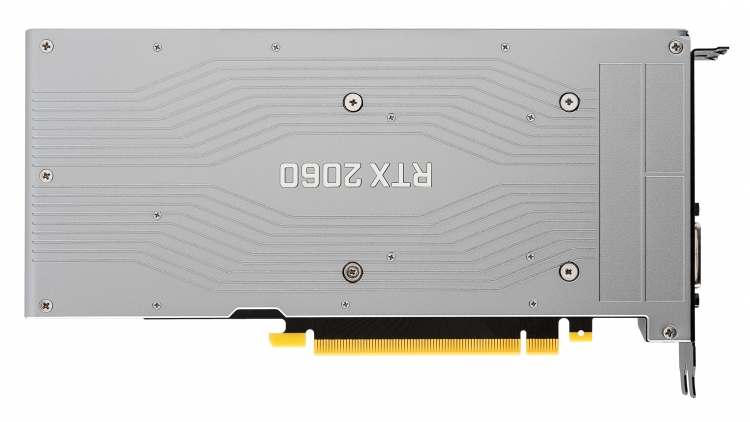
Dimensions GeForce RTX 2060 FE substantially less, than older models, but there are also a number of other differences. As RTX 2070, card interface lacks NVLink, and the place of one of the connectors taken DisplayPort output DVI-D: as soon as this class adapters are not designed for the game at a resolution higher than 1440p, they can still be used in conjunction with the old monitors. At the same time, NVIDIA has retained connector USB Type-C, which allows to connect a video card with a helmet on DisplayLink VR protocol or any PC connected to a periphery at a data rate up to 10 Gb / s.
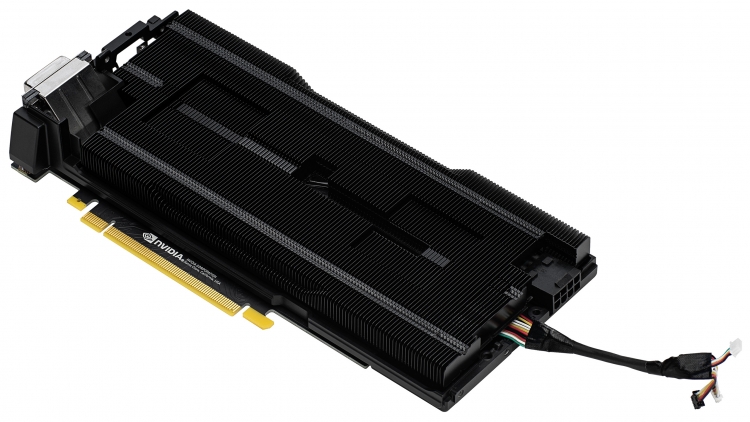
The casing cooling system, made of thick aluminum plates, It surrounds the interior of the graphics card on three sides and allows two fan diameter 85 mm blows air along the short side of the circuit board. Radiator fills all the available space within the housing inside, but its design is greatly simplified compared to the GeForce RTX 2080 и RTX 2080 Ti and resembles a reference card family GeForce 10. Evaporation chamber does not cover the entire area of the printed circuit board and pressed only to the GPU chip, and the heat distribution of the heat sink fins helps Heat-flat. other components, requiring active cooling,, covered with a separate metal frame.
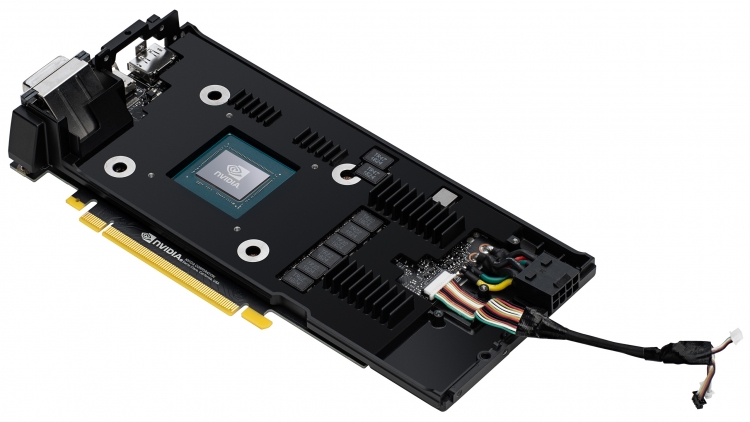
Printed circuit board
The printed circuit board GeForce RTX 2070 passed to the younger model with minimal changes. NVIDIA has removed two of the eight chips GDDR6, but all the voltage regulator components remains intact. VRM has six phases for the GPU power supply and two - for the RAM chips. PWM controller uPI uP9512 combined with chips DrMOS (FET with integrated driver) It provides high and accurate monitoring of the voltage at the drain of transistor IMON signal and to dynamically adjust the number of active phases in order to maintain high efficiency over the entire range of power consumption.
Additional power through a single graphics card gets Eight-socket. If we consider the power line PCI Express slot, rated power of the device can reach 225 W, but connector wiring says, that a serious overclocking GeForce RTX 2060 FE is not prepared. Here's the thing: printed circuit board Founders Edition shorter cooling system, and, to the power supply cord can be connected to the end of the body, PCB connector is connected to an intermediate cable, wherein "plus" line and "lands" are collected in two bundles, each of which is sealed at one opening (yellow and green wires are used by some power supply for voltage control, but in most cases, act as additional "ground"). The same design we saw in the reference version of GeForce GTX 1060. Hardly GeForce RTX 2060 FE is threatened, even with a moderate GPU acceleration, but it is simply not the most elegant solution, and a potential source of problems in the case of soldering defect PCB assembly.
